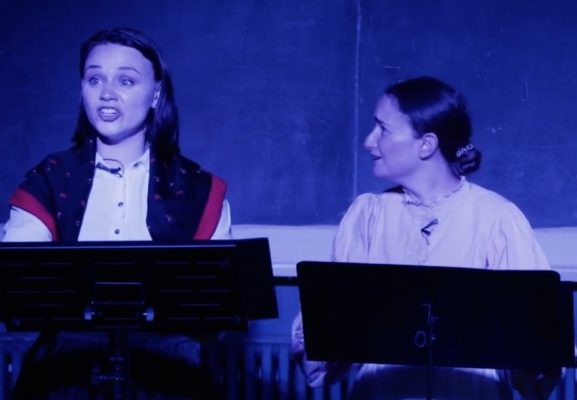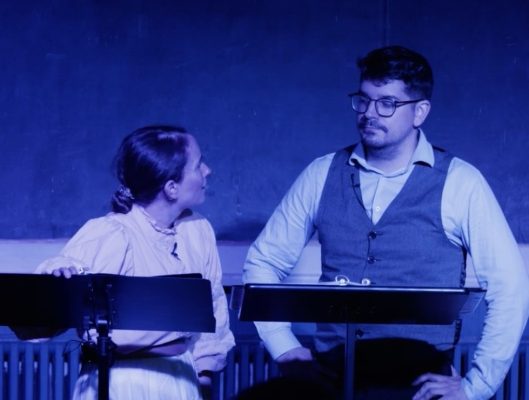
Watch a play set in 1893 at a venue founded in 1868.
Poppenhusen Institute hosts performances of A Great Wave II on Saturday, June 7, and Sunday, June 8.
Written and directed by Jackson Heights resident Tom Block, the plot deals with German immigration, the women’s suffrage movement, and assimilation in College Point, which was known as “Little Heidelburg” due to its large German population in the mid 19th century. (It’s the sequel to “A Great Wave,” which looked at the neighborhood’s growth in the same time period.)
Admission is free, and the showtimes are June 7 at 7 pm and June 8 at 3 pm. Seating is limited, and reservations can be made by email ([email protected]) or phone (718-358-0067).
A Great Wave II’s cast consists of the same four German immigrants from the prequel – Jürgen, his daughter Annalisa, his son Hermann, and his daughter-in-law Susanna (Hermann’s wife) – and introduces Alfred (Annalisa’s husband).
The more recently arrived Alfred chafes at Annalisa for working outside the home and fighting for women’s voting rights. His Old World mind can’t deal with women’s liberation.
Hermann and Susanna, who arrived in America six years earlier, find themselves stuck between the two cultures. Hermann supports his sister, but on the other hand, he’s not thrilled with Susanna’s newfound liberty.
The group has late-night discussions while also taking English classes at Poppenhusen, visiting the Grand View Hotel for a meeting about the volunteer ambulance corps, and walking by mansions on the North Shore. Finally, Alfred and Hermann get into a fist-fight, and Alfred ends up in a jail cell in Poppenhusen’s basement.
A Great Wave II is about 45 minutes long, and a reception follows both presentations. The cast includes Rachel Halper (Susanna), Actors Equity Association member Jake Laurence (Hermann), Clara Steeves (Annalisa), and Joseph Sanford IV (Alfred).
Block has written 12 books, and his plays have been developed and produced at such venues as the Theater for the New City, Theater at the 14th Street Y, and the University of Glasgow (Scotland). He’s also a Founding Producer of New York City’s International Human Rights Art Movement.

The Next Big Thing
Poppenhusen will host a Tina Turner tribute, “A Summer Garden Concert: The Girls Next Door,” on Sunday, June 29, at 3 pm.
The Venue
In 1868, Conrad Poppenhusen financed a four-story building at 114-04 14th Rd. in College Point. The Poppenhusen Institute housed the first free kindergarten in the United States (established in 1870) as well as a vocational high school, courthouse, jail (two vacant cells are still there), bank, library and grand ballroom. It was designated a New York City landmark in 1970 and made the National Register of Historic Places in 1976.
It’s still around these days, hosting such programs as karate, concerts, and plays like A Great Wave II.
The Man
Born in Germany in 1818, Conrad Poppenhusen was a whalebone purchaser in 1842, when a huge fire destroyed large parts of his native Hamburg, forcing him and his wife to immigrate to Manhattan.
He remained in the whalebone business at first. But in 1852, he got a license to use Charles Goodyear’s process to vulcanize rubber. Then, he started manufacturing everything from caster wheels to brushes in his Manhattan factory, Enterprise Rubber Works. With business booming two years later, he moved his operation to College Point, which was a rural peninsula in northeastern Queens at the time. His factory workers, most of whom were German immigrants as well, followed him.
Poppenhusen made a lot of money and he was extremely generous, becoming the leader of a de facto corporate town. First, he drained the marshes. Then, he paved the roads, planted trees, constructed a railroad station, installed sewers, and laid water and gas lines. He even donated money for a church and the Poppenhusen Institute, which he endowed.
Grand View Hotel
In 1892, John Jockers, another German immigrant, converted a large personal residence into the 11-room Grand View Hotel and Park in College Point. Thanks to ferry and railroads stops, the hotel was a popular resort with grass tennis courts and well-respected restaurant. (Please see the above paragraph about the play’s characters and the Grand View.)
Jockers slowly sold many of the acres to developers. As housing sprang up around it, the mansion transformed into a boarding house in the 1910s and then an apartment building in 1923. Today, the house has seven units, no cornice, and very little stucco. Regardless, it obtained New York City Landmark status in 2009 after a legal battle between local historians and the owner, Robert Cunniffee, who opposed the designation. Its name is the Herman A. and Malvina Schleicher House (the original owners) and it’s located at 11-41 123rd St.

Images: Tom Block
